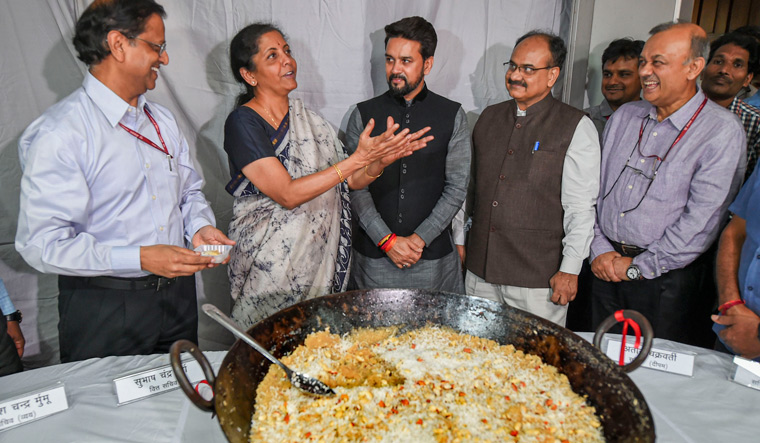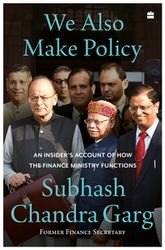Subhash Chandra Garg has let his pen speak his mind far too often. Serving as finance secretary to three finance ministers—Arun Jaitley, Piyush Goyal, and Nirmala Sitharaman—he churned out opposing views, much to Sitharaman’s displeasure.
When things got too hot, Garg took voluntary retirement, but his pen kept talking. His third book in four years since retirement, We Also Make Policy (HarperCollins India), has caused a flurry with its fly-on-the-wall descriptions of what goes on in North Block.
In an exclusive interview, his first on the book, Garg explains why what happens in the power corridors need to be told, and sheds light on how things went wrong with Sitharaman. Excerpts:
Q/ In the book, you talk about the wonderful relationship with Prime Minister Narendra Modi and his mood changing towards the latter part of your tenure. You also mention how he wanted to align the financial year with the calendar year. How would you evaluate his viewpoints?
A/ I had a clear view that Modi is a man who can take a lot of reform measures. [Though] he had also tried misadventures like demonetisation, I had a very positive view about him, [with] the kind of hard work he was putting in and [his] ability to take hard decisions.
I was looking forward to serving [as finance secretary] where I could bring reforms which were as good, if not better, than the 1991 change, and India’s trajectory to move towards a private sector-led government, away from the dominance of the public sector-led inefficient financial system. On the whole, it was a very functional and professionally satisfying time with him as prime minister. When I was proposed to be transferred, I told P.K. Mishra (principal secretary to the prime minister) that even when I go out of the government, I would like to work with him.
Of course, there would be issues, particularly in the latter part of my tenure. There is a chapter where I record Nripendra Misra (former principal secretary to the prime minister) telling me ‘You are not in tune with the thinking of the government; the finance minister is not happy with you, [and] the prime minister is not happy with you’.
So in the later six months or so, Modi perhaps was of this view that I was not attuned to the political side of it. Maybe that was the reason for the coldness.
Q/ What do you think the Modi government got right, and what went wrong?
A/ This government has perhaps left the economic reforms on the wayside and has gone into more of freebies and welfare and the political side of it. It has taken eyes off the economic ball, and it is reflected everywhere—whether you take the PSU privatisation programme or other reforms in the financial sector. In fact, there is more government now all over, reflected in high capital expenditure and PLIs. The second term in terms of economic reforms is very different. I think we have lost the plot as far as economic reforms are concerned.
Q/ What went wrong between you and Sitharaman? Was there a whispering campaign against you?
A/ I have no idea about the whispering campaign. I have said a little [about it] in the book, but I have no specific information, only circumstantial insight, on whether there was a whispering campaign against me.
For example, when the Reserve Bank recapitalisation was being negotiated, I had written a strong dissent note. Surprisingly, she took a position that I had no right to write a dissent note. I said, ‘No, Madam, I have every right to record my views. If you want me not to do it, you will have to give me a government order not to write so’.
What made her take that view, to dissuade me from writing my views? I don’t think it was moved by the pious intention that the government and the Reserve Bank should not be having any differences. It was perhaps more by people lobbying saying it was inappropriate for the secretary to write a dissent note. What exactly went about, who briefed her, who took it up, that I have no idea.
I don’t think it was that long a time for us to have professional differences. We worked together only for 55 days.
 Sweet and sour: S.C. Garg with Nirmala Sitharaman and Anurag Thakur during the ‘Halwa Ceremony’ to mark the beginning of printing of budgetary documents in June 2019 | PTI
Sweet and sour: S.C. Garg with Nirmala Sitharaman and Anurag Thakur during the ‘Halwa Ceremony’ to mark the beginning of printing of budgetary documents in June 2019 | PTI
Q/ You’ve written that she said you were treating her like a ‘child’.
A/ That is somewhat later. I think she came with that notion, which is not correct in my judgement. She perhaps had this impression that I was running the finance ministry. And she perceived that I believed she did not have much knowledge of finance and therefore I would perhaps treat her differently. That is her assessment; it is not my assessment.
For me, she was the finance minister. In India’s history, [there were] many finance ministers who were complete greenhorns, who had no idea. But all those people were bright, who had abilities to quickly learn. Yashwant Sinha in his biography has said that when he joined the finance ministry, he didn’t know much, but took time to understand and learn, and others helped. And quickly the political bosses become the real masters of decision making.
Sitharaman had a personality and she had a way to deal with it, officers and others, but those to my mind were not the primary reason. She shouldn’t have allowed that to determine what was a functional relationship. [And then that] functional relationship started breaking off. I have recorded an instance where the note sheet with my comments was changed.
Q/ A fresh file was prepared without the dissent notes.
A/ It was the first time in my life I signed such a thing, because I had to see the budget through. Any other time, I wouldn’t have allowed [that file] to go that way.
These are very senior positions—finance secretary or the finance minister. They have much larger responsibilities. We should see to it that they work together for the national interest.
Q/ Quite a few high-profile economic ‘leaders’ exited with a whiff of controversy in the past nine years of the government. Your book mentions Reserve Bank Governor Urjit Patel being described by Modi as a ‘snake who sits over a hoard of money’. Then there is Raghuram Rajan, Arvind Panagariya, Arvind Subramanian, and you. Why did this happen?
A/ Except Rajan, all of them were appointed by Modi, be it Panagariya, Subramanian; include Viral Acharya also.
These were the brightest people in this country, and they left. Maybe as things went along, he might have felt that they offered solutions that were not homegrown; ‘Harvard vs hard work’, that kind of thing.
But you would also find it very interesting that in the second term there is no economist or independent bureaucrat working with him. I can only surmise that he has perhaps realised that it is better for him to work with less independent minds than getting into intellectual kind of things.
In my judgment, it is very contrasting and this is perhaps the reason why we today have a situation where many of our institutions are not manned by people of high calibre. I don’t want to name names like the CAG or this and that. Maybe it is more comfortable because these people will not argue with him. But it is very clear, this difference between the first term and the second term and the quality of people working with him are as different as chalk and cheese.
We Also Make Policy
By Subhash Chandra Garg
HarperCollins India
Price Rs799
Pages 520
Book excerpts
Sitharaman carried a definite bias against me
On 11 June 2019, Finance Minister Nirmala Sitharaman was chairing the first of the pre-Budget consultation meetings in North Block. Only twelve days had gone by since she assumed charge, including the days spent at the G-20 finance ministers’ meeting in Japan. It was a Budget consultation meeting with agriculture experts and representatives. As finance secretary, I was conducting the proceedings.
Pre-Budget consultations essentially involved listening to invitees for their views and suggestions for framing the Budget. Sometimes the finance minister and secretaries do ask for some clarifications or to elaborate specific suggestions but the thinking of the government on the specific proposals is never revealed or even hinted at.
At one stage of the meeting, I routinely stated this protocol. Finance ministers take this as a matter of routine and formality. However, Nirmala Sitharaman reacted strongly. First, she said that she would abide by whatever I, as finance secretary, said. A few seconds later, she shot at me in a visible display of anger: ‘What do you think, I cannot violate you? I would.’
The people in the room pretended not to take note of this unexpected blow-up. The meeting proceeded as if nothing happened. I found the episode both disconcerting and embarrassing. However, I did not react in the meeting and continued with it without any visible reaction. I had noticed her disturbed state of mind in the few days that we had worked together. I had also noted that she carried a definite bias against me.
After the meeting, I went to her chamber for a frank talk. In the room, she accused me of treating her like a bachchi (a child).
Excerpted with permission.



